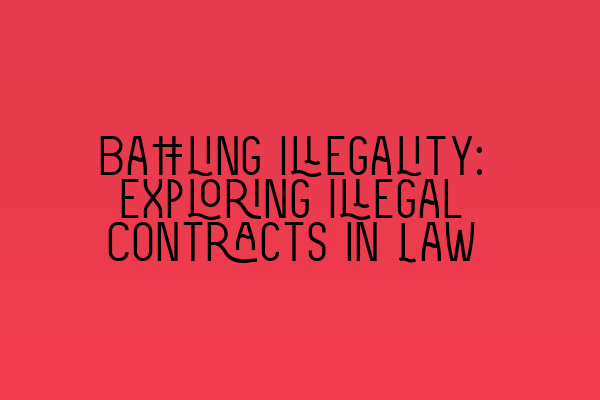Battling Illegality: Exploring Illegal Contracts in Law
Welcome to our blog post on the fascinating topic of illegal contracts in law. In this article, we will delve deep into the concept of illegality in contracts and explore its various aspects. If you’re studying for the SQE exams, make sure to check out our related articles on practice exam questionshere and preparation courseshere.
Understanding Illegal Contracts
In contract law, an illegal contract is one that involves an agreement that is against the law or contrary to public policy. Such contracts may arise from various factors, including unlawful purposes, illegal consideration, or illegal acts contemplated in the agreement. It is important to note that illegal contracts are generally void and unenforceable by the courts.
When determining the illegality of a contract, courts consider the nature of the illegality and its impact on public policy. Contracts that involve activities such as fraud, gambling, or the sale of illegal substances are typically deemed illegal. Additionally, contracts that violate statutory or regulatory provisions, such as contracts to conduct illegal activities, are also considered illegal under the law.
Consequences of Illegal Contracts
The consequences of entering into an illegal contract can be severe. In general, illegal contracts are considered void ab initio, meaning they are treated as if they never existed. This means that parties to an illegal contract cannot enforce the terms of the agreement and cannot seek remedies for any losses suffered.
Moreover, engaging in illegal contracts may expose the parties involved to legal consequences. This can include criminal charges, fines, and penalties imposed by regulatory bodies. It is therefore crucial for individuals and businesses to be aware of the legality of their contracts and to seek legal advice when in doubt.
Exceptions to the Illegality Rule
While illegal contracts are generally void, there are some exceptions to this rule. These exceptions arise from the need to protect innocent parties or to avoid injustice in certain circumstances. For example, if one party is significantly more at fault for the illegality than the other, the innocent party may seek relief from the court.
Another exception is the doctrine of severance, which allows a court to remove the illegal provisions from a contract and enforce the remaining lawful terms. This is only possible if the legal parts of the contract can stand alone and are not dependent on the illegal provisions. The court will consider factors such as the seriousness of the illegality and the parties’ intentions when deciding whether to sever the illegal terms.
The Importance of Avoiding Illegal Contracts
As a solicitor, it is essential to advise clients on the implications of entering into illegal contracts. By guiding clients towards legal and enforceable agreements, you can help them avoid the risks and consequences associated with illegality.
Understanding the intricacies of illegal contracts is also crucial for passing the SQE exams. To enhance your preparation, make sure to check out our practice exam questionshere and our SQE 2 preparation courseshere.
In Conclusion
Illegal contracts pose significant challenges in contract law. It is vital for solicitors to have a comprehensive understanding of the principles and exceptions surrounding illegality to provide effective legal advice and protect their clients’ interests. By keeping yourself updated on legal developments in this area and studying relevant cases, you can enhance your expertise as a contract law practitioner.
For more information on SQE exam dates and preparation, check out our related articlehere. Stay tuned for our future blog posts, where we will continue to explore interesting topics in contract law.
